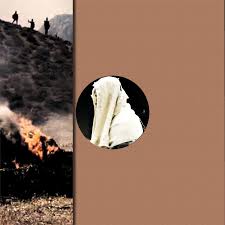Delta is one of those albums that feels like it has emerged, fully-formed and wonderfully weird, from a parallel universe or sickly secret society that we’ve never heard of but always suspected might be lying underneath our own. In reality, this mysterious world is the multi-faceted musical underground of Italian capital Rome, for which Toni Cutrone is one of the foremost poster boys as Mai Mai Mai and in noisy, psychedelic bands like Hiroshima Rocks Around, not to mention through his work as a venue owner, label boss and organiser of the Thalassa festival in the Eternal City. It makes sense, therefore, that Rome seems to inhabit Delta, an album that is as busy as its home city, and just as enigmatic.
More specifically than Rome as a whole, it’s the working class, socially and ethnically diverse district of Roma Est, the setting for many an iconic Italian film, that informs much of the capital’s underground scene, but Mai Mai Mai’s music feels more outward-looking. Cutrone is a well-travelled individual, born on an island in the Aegean sea, and, of course, the title itself hints at the other historical giant of the Mediterranean, Greece. Delta stretches back and forwards through time, reaching into the past to toy with Cutrone’s memories and the wider scope of history, before re-imagining these capsules of the past in a muddled, genre-less present and future. The memories are suggested by field recordings garnered from around the Mediterranean, echoing Cutrone’s childhood spent following his parents from country to country and dissolving distinct references into a pool of combined sound worlds. Instantly, the UK "hauntology" scene of Demdike Stare and others springs to mind, but there is a playfulness behind Mai Mai Mai that many a British act seem to lack. Tracks bubble with wobbly analogue synthesiser lines and drones, consistently disturbed and unsettled by bursts of gristly noise. Beats are dropped casually into tracks, deployed sparingly but with subtle rhythmic force. Delta feels alchemical, a smartly distilled collection of sounds brewed together into a heady cocktail of genre-less, arrhythmic post-everything.
There are nonetheless certain references points that emerge as signposts across the four tracks that make up the album. Second track ‘Βυζάντιον’ is a listless slice of electro/noise/drone, all moody sci-fi synths and muted post-dubstep micro-beats, but the presence of a Christian choir in the background unsettles the track’s dynamic, injecting a pall of unease. Italy is a country dominated by Catholicism, but Cutrone draws a curious parallel between the established church and an inchoate form of paganism, as if the churches of Italy had all been built on the smouldering ashes of wicker men. Equally, the sound lexicon of Italian giallo and gothic horror is forever close to Delta‘s shifting surface, imbuing the album with a distinct sense of unease and threat, and the Catholic references only seem to enhance this, echoing Goblin’s soundtrack for Dario Argento’s baroque masterpiece Suspiria. Elsewhere, modernity and the past collide viciously on ‘τετρακτύς’, which sounds like early Cabaret Voltaire recorded in an abandoned Fiat factory.
At 29 minutes, Delta doesn’t really deserve to be called an album, but Cutrone deserves admiration for how much he crams into such a short space of time, preventing the listener from ever locking the record into the straightjackets of genre and influence. Cutrone emerges as a wholly individual character, similar to the likes of Failing Light, Hacker Farm or 1612 Underture, but equally completely different. Delta is a weird object, and unlike anything else you are likely to hear in 2014. I can’t wait to hear what happens when he stretches things out a bit.


